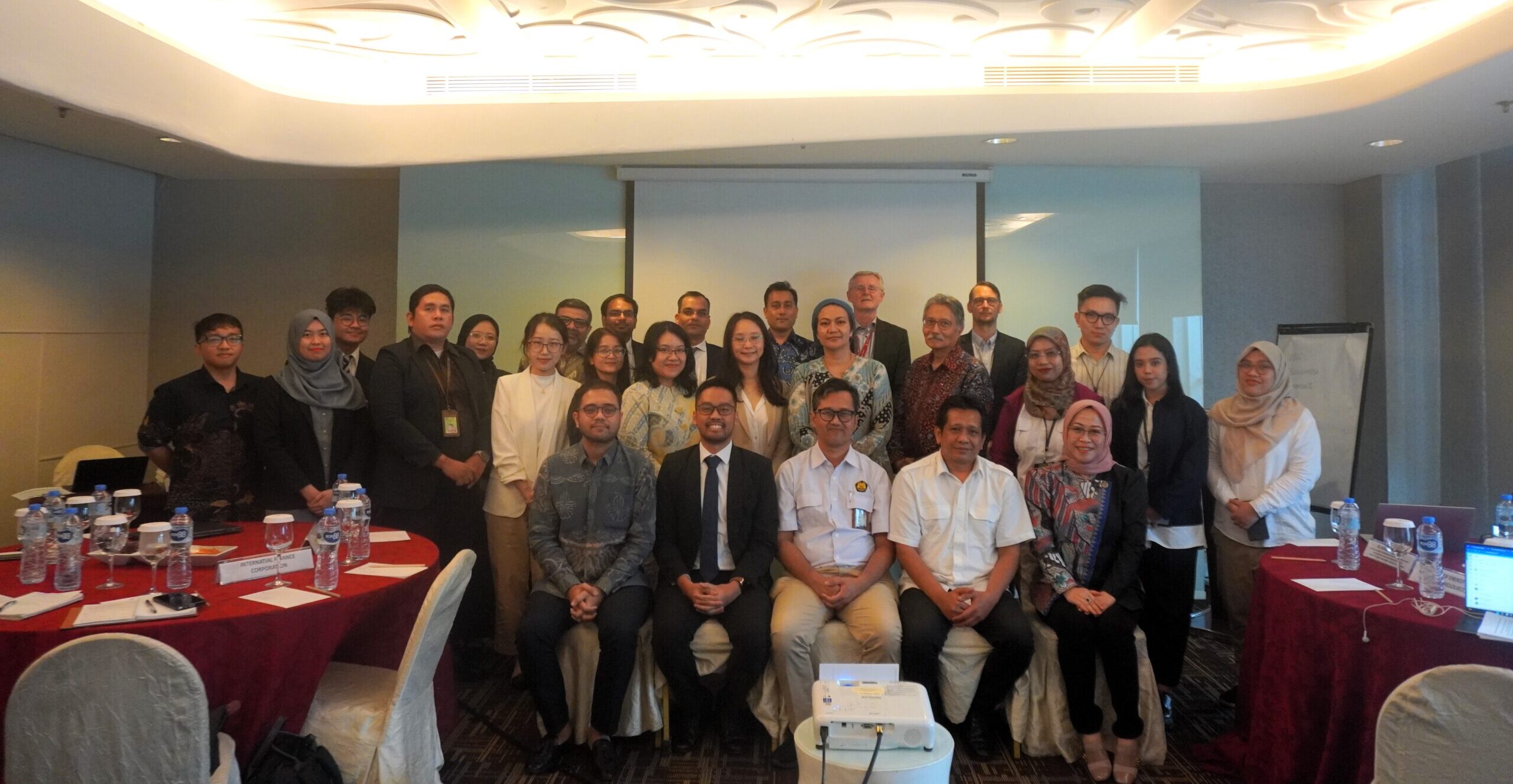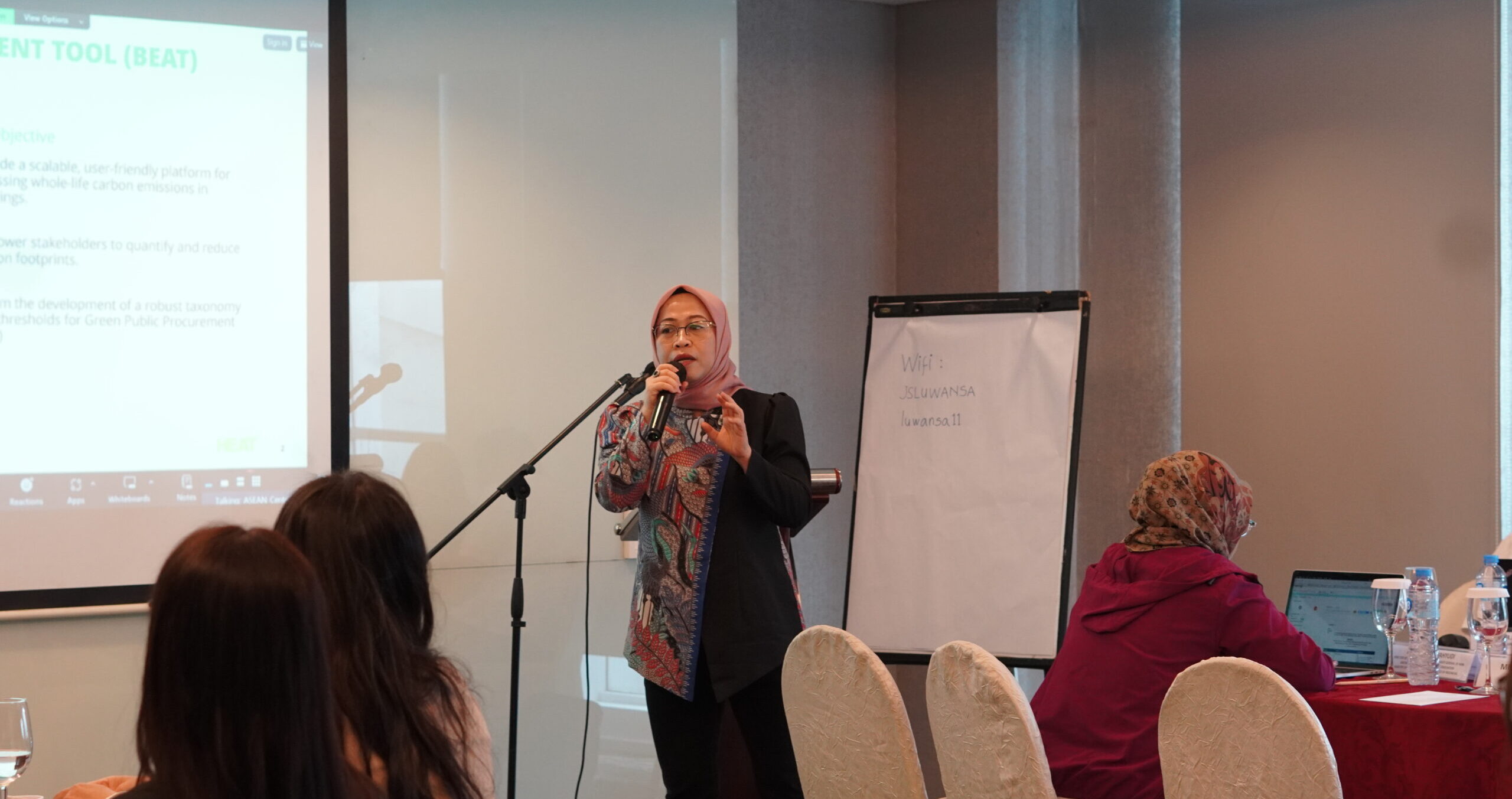Menu

Photo 1. Group photo of the workshop participants
The ASEAN Centre for Energy (ACE) organised a Stakeholder Workshop on Regional Building Energy Efficiency Database and Investment Matching Platform on Thursday, 28 November 2024, hybrid with in-person participants in JS Luwansa Hotel, Jakarta, Indonesia, and online in Zoom. The workshop was held as part of the Asia Low Carbon Buildings Transition (ALCBT) project, funded by the International Climate Initiative (IKI) of the German Federal Ministry for Economic Affairs and Climate Action (BMWK).
The workshop gathered almost 100 key stakeholders, with 33 in-person participants and 66 joining virtually, to consult on developing a regional one-stop-shop platform for energy efficiency database and investment matching. The participants represented diverse stakeholder groups including government officials from ASEAN member states (AMS), financial institutions, international organisations (IOs), experts/academics, consultants, energy service companies (ESCOs), building associations, project developers and technology providers. The web-based platform will host project databases, standardised tools, and accelerators for assessing energy efficiency, carbon emission, and financing matchmaking for building energy efficiency projects.

Photo 2. (left-right) Opening remarks by Hendro Gunawan from Ministry of Energy and Mineral Resources, Indonesia; Fajar Santoso Hutahaean from Ministry of Public Works, Indonesia; Rizky Aditya Putra, Programme Manager of ALCBT project at ACE.
The opening session began with remarks from Hendro Gunawan, Deputy Director for Technical Cooperation of Energy Conservation, Directorate General of New and Renewable Energy and Energy Conservation, Ministry of Energy and Mineral Resources (MEMR), Indonesia, outlined Indonesia’s ambitious energy conservation goals and recent policy developments, emphasising Indonesia’s commitment to developing a one-stop digital platform providing access to vendor portfolios, databases, and success stories while encouraging online reporting for energy management. Fajar
Santoso Hutahaean, Head of Data and System Development Sub-Directorate, Ministry of Public Works of Indonesia, emphasised the critical role of buildings in decarbonising the energy sector. He outlined the Ministry’s key initiatives including the implementation of green building regulations requiring at least 25% energy conservation and 10% water conservation in buildings. The Ministry also explored innovative financing mechanisms, including green funds through grants and low-interest loans, and piloting retrofitting projects through partnerships with various institutions.
Rizky Aditya Putra, Programme Manager of ALCBT at ACE, presented the workshop’s strategic importance in the broader regional context. He highlighted the importance building sector in ASEAN’s energy landscape, which accounts for 22% of ASEAN’s total energy consumption and contributes to 21% of energy-related greenhouse gas emissions. He reiterated that the ALCBT project, through its four key components – standardised tools development, enhanced industrial capacity, financial pathways establishment, and regional knowledge sharing – aims to catalyse the transition towards low-carbon buildings. The proposed platform will serve as a crucial tool in bridging the gap between building projects and potential financiers while providing a comprehensive framework for assessing and monitoring building performance across the region.

Photo 3. Presentation by Herlin Herlianika from HEAT International
Following the opening remarks, participants engaged in scene-setting presentations. The Global Green Growth Institute (GGGI), as the lead consortium of ALCBT, introduced the ALCBT project overview and outlined plans for developing a pipeline of bankable low-carbon building projects, including through the establishment of green finance networks across the five target countries. HEAT International presented its Building Emission Assessment Tools (BEAT), which comprehensively evaluates both embodied and operational carbon in buildings while providing transparency and adaptability for different functionalities. KPMG presented their market research findings on the energy efficiency landscape in ASEAN, highlighting key opportunities for platform development through analysis of existing standards, frameworks, and financing mechanisms across the region.

Photo 4. Presentation by Dr Jin Guang Yu from SLEB Smart Hub platform (left); Discussion moderated by Rio Jon Piter Silitonga, Senior Officer of CEE Department at ACE (right)
The second session, moderated by Rio Jon Piter Silitonga, Senior Officer of Energy Efficiency and Conservation (CEE) at ACE, showcased three existing energy efficiency platforms in ASEAN. The Building and Construction Authority of Singapore presented their SLEB (Super Low Energy Building) Smart Hub platform, which features AI-driven energy assessment tools, performance monitoring capabilities, and green financing facilitation features to accelerate energy efficiency improvements in Singapore’s building sector. The International Finance Corporation introduced its EDGE (Excellence in Design for Greater Efficiencies) platform, an open-source platform that takes a quantitative approach to assessing building efficiency across energy, water, and embodied carbon metrics. Department of Alternative Energy Development and Efficiency (DEDE), Thailand, shared its digital platform that integrates comprehensive Measurement & Verification capabilities with energy efficiency project databases, facilitating connections between entrepreneurs and investors while providing mechanisms for tracking real project performance.
The third session explored various financing mechanisms and opportunities for energy efficiency projects. The Indonesia-Denmark Energy Partnership Programme (INDODEPP) through the Danish Energy Agency presented Denmark’s comprehensive approach to promoting energy efficiency in buildings, demonstrating its 40-year track record in implementing public policies and regulations. Their model emphasises leading by example through both regulatory frameworks and technological innovations. United Overseas Bank (UOB) introduced its U-Energy program, Asia’s first integrated energy efficiency financing platform. The Thai ESCO Association detailed their business model built on Energy Performance Contracts, Measurement & Verification, and Performance Guarantees, which highlighted the importance of combining robust regulatory frameworks, innovative financing mechanisms, and standardised performance measurement approaches to accelerate energy efficiency adoption in buildings.

Photo 5. Forum group discussion on the ASEAN Energy Efficiency Database and Investment Matching Platform
The final session, facilitated by KPMG, focused on gathering stakeholder feedback for developing the ASEAN Energy Efficiency Database and Investment Matching Platform. The proposed platform’s three main components were examined: a Building Energy Efficiency Project Database, Energy Efficiency Calculators, and a Project Matchmaking feature. Participants explored key considerations including data collection frameworks across macro, building, and system levels, as well as the integration of passive design components. Throughout the discussion, participants emphasised the importance of balancing technical comprehensiveness and user-friendliness, while ensuring the platform can integrate with existing data sources and accommodate different country contexts and standards.
The ALCBT project is a five-year initiative supported by the Federal Ministry for Economic Affairs and Climate Action of Germany under its International Climate Initiative (IKI) to promote low-carbon buildings in Cambodia, India, Indonesia, Thailand, and Viet Nam. The project is being implemented by a consortium led by the Global Green Growth Institute (GGGI) with HEAT International, ASEAN Centre for Energy (ACE), and Energy Efficiency Services Limited (EESL) as consortium partners. The project aims to develop tools for managing building carbon emissions, enhance stakeholder capacity, establish financing pathways, and promote knowledge sharing.
—
Summary Report: here
